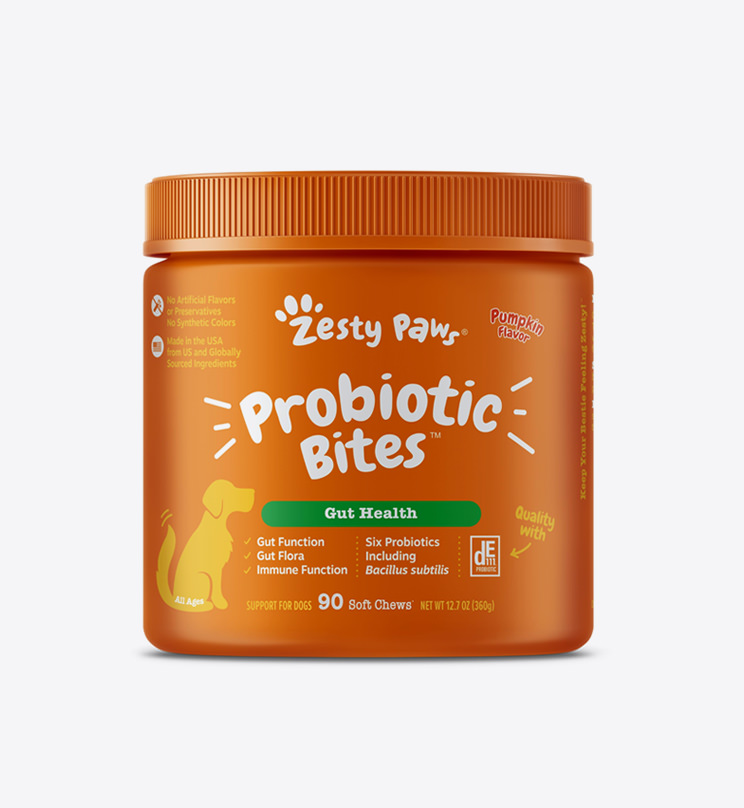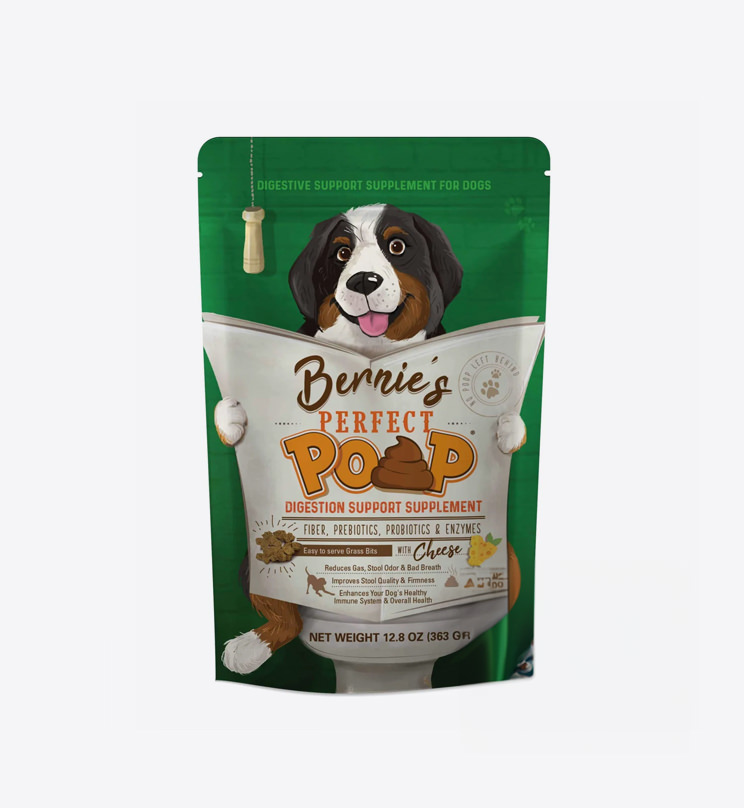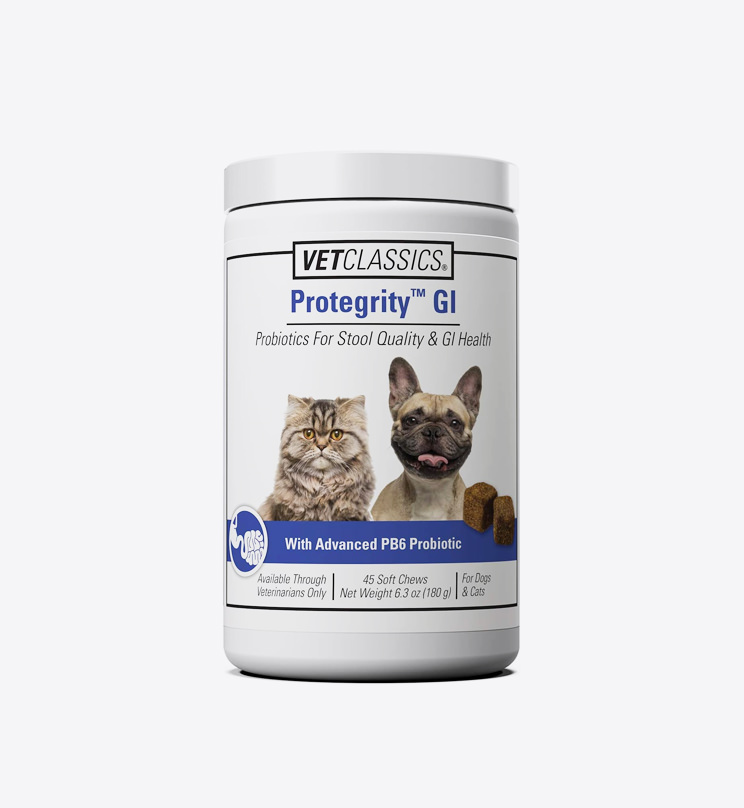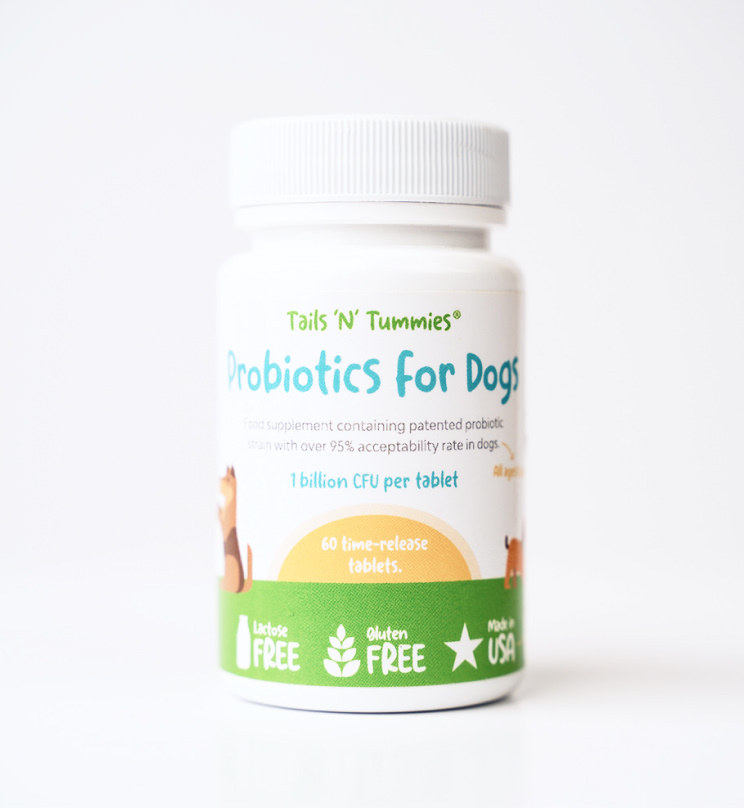Reviewed by Amanda Reynolds, DVM
Updated on Jan. 5, 2026. Published on December 4, 2023.
Probiotics for Dogs: A Must-Have for Overall Health
Did you know? A whopping 70% of your dog's immune mojo is hanging out in their gut. So, if their gut isn't in top shape, a whole bunch of issues can pop up. We're talking things like inflammatory bowel disease, constant paw biting, scratching, and those pesky tear stains—all possibly due to a bacterial party gone wrong in their belly.
And here's the kicker: an off-kilter gut can mess with more than just their physical health. It might even play a role in their mood swings, pushing them towards feeling anxious or down.
The good news? Picking the right Probiotic or Digestive Supplement can be a game-changer. Many folks have seen their pups turn a corner in just a few weeks. Stick around to dive into the perks and check out our top 5 expert picks.
The Downside of Neglecting Gut Health
Not looking after your buddy's gut health? That might just lead to a bit of discomfort or, in some cases, pretty serious health issues. Here's what could happen:
Allergies
Skin irritations and itchy skin
Chronic or intermittent diarrhea
Paw biting and licking
Gassiness, flatulence and bloating
Behavioral issues linked to anxiety
Nutritional imbalance and deficiencies
Yeast infections
The Upside of Probiotics
There's a bunch of research that sings praises for probiotics for our four-legged pals. Probiotics are like a team of good bacteria. Once your dog gets them, they help tackle the not-so-friendly bacteria in the gut. Here's what probiotics bring to the table:
The Power of High-Quality Dog Probiotics:
Key Features in Dog Probiotics
All dog probiotics aren't made the same. Make sure you're going for one that has the following criteria:
Lactobacillus Strains
One of the most beneficial bacteria for canine gut health, Lactobacillus aids in digestion and helps combat harmful bacteria, ensuring a balanced gut flora.
Single Strain Focus
The best probiotics prioritize a potent, singular ingredient that targets specific gut health issues, rather than a mix that might dilute the overall effectiveness.
No Allergens
Given the sensitivity of many dogs to common allergens, it's crucial that probiotics are free from potential triggers, ensuring that the supplement only brings about positive changes.
Safety and Purity
It's essential that the probiotic is free from fillers, artificial additives, and harmful chemicals. A clear and transparent ingredient list is a sign of a trustworthy product.
The Must-Have Probiotics Checklist
You want to make sure you're getting real value when buying a Probiotic. To steer clear of ineffective products, ensure your Probiotic features the following:
High CFU Count
The probiotic should boast a substantial number of CFUs (Colony Forming Units), ideally 2+ Billion CFU, to ensure a significant amount of live beneficial bacteria.
100% Money-Back Guarantee
The best probiotics are backed by brands that offer a full money-back guarantee, reflecting their confidence in the product's effectiveness.
Presence of Lactobacillus
This beneficial strain is crucial for canine gut health and should be a primary ingredient in the probiotic.
Clear Ingredient List
The probiotic should have a transparent list of ingredients, focusing on core components without unnecessary fillers or potential allergens.
Positive Customer Feedback
The product should have garnered positive reviews and testimonials from other dog owners, indicating its effectiveness and reliability in real-world scenarios.
How We Picked the Best 5
In our quest to identify the top probiotics for dogs, we delved deep into the world of canine nutrition and gut health. Our team, led by dog nutrition experts, evaluated numerous products on the market to bring you the best of the best.
Effectiveness
We prioritized products that have shown significant results in alleviating common gut-related issues in dogs, such as paw biting, allergies, and digestive problems. Real-world testimonials and clinical studies were key indicators for us.
Ingredients
The ingredient list was scrutinized to ensure that the probiotics contained beneficial strains like Lactobacillus and avoided potential allergens. We also looked for products that emphasized single, potent strains over a mix of many.
Value for Money
It's not just about the price tag. We considered the overall benefits, the number of CFUs, and the quality of ingredients to determine if the product offers good value for its cost.
Customer Service
Brands that stand by their products with guarantees, responsive customer service, and clear instructions scored higher on our list. After all, the well-being of our furry friends is paramount, and we believe in recommending brands that feel the same way.
The Top 5 Dog Probiotics of 2026
Pros
Only 7 Ingredients, Perfect for Dogs with Food Sensitivities
95% of Dogs Eat These Willingly (No Food Hiding Required)
Patented Lactobacillus Strain with Proven Digestive Benefits
24-Hour Coverage with Once-Daily Time-Release Formula
Focused Single-Strain Formula (Less Risk of Stomach Upset)
Cons
Two Bottles for Large Dogs
Limited Flavor Variety
Rated 4.7/5 stars by thousands of dog owners
The Bottom Line
Tails 'N' Tummies' Probiotics for Dogs has carved a niche for itself in the realm of canine supplements. Its formulation is a testament to the brand's commitment to canine health. The decision to use minimal ingredients is commendable, especially in today's market where many products are laden with unnecessary additives. This approach is particularly beneficial for dogs with food sensitivities, ensuring they receive the benefits of probiotics without the risk of adverse reactions.
The product's impressive 95% acceptability rate is indicative of its effectiveness and palatability. It's a challenge to create a product that dogs willingly consume, and Tails 'N' Tummies seems to have achieved this feat. This high rate of acceptability ensures that pet owners can administer the supplement without the usual struggles associated with medication or supplements.
Another standout feature is the patented form of Lactobacillus used in the probiotic. This unique strain is tailored to offer optimal digestive health benefits while minimizing potential side effects. It's evident that a lot of research and care went into selecting this particular strain, ensuring dogs get the best possible results.
The time-release tablets are another thoughtful addition. They ensure that dogs receive a steady and consistent supply of beneficial bacteria throughout the day. This sustained release means that a single dose can offer 24-hour coverage, making it convenient for pet owners and effective for pets.
Feedback from dog owners further underscores the product's efficacy. Many have reported noticeable improvements in their pets' digestive health, fewer yeast infections, and an overall boost in well-being. Such feedback is invaluable as it provides real-world evidence of the product's benefits.
In conclusion, Tails 'N' Tummies' Probiotics for Dogs is a well-rounded product that combines quality, effectiveness, and user satisfaction. For those in search of a reliable probiotic supplement for their furry friends, this product warrants serious consideration.
Is Tails 'N' Tummies Right for Your Dog?
Chronic diarrhea or loose stools
Food allergies and sensitivities
Gas, bloating, or digestive issues
Support during antibiotic treatment

Probiotic Bites
Pros
Natural Ingredients
Comes in Two Flavors
Vet Formulated Brand
Cons
Contains Too Many Probiotic Strains
Contains Potential Allergens
Lower Probiotic Dose
The Bottom Line
Taking a closer look at Zesty Paw’s Probiotic Bites, there's a mix of high-fives and hmm's. On the upside, they're crafted by vets, brimming with Omega-3s, sport a commendable probiotics tally, and even throw in a couple of flavor options. But they're holding onto our number two position, and let's get into the why.
The biggie here? They aren’t focusing on a single-strain probiotic. Having that laser-focused strain can be especially vital for nailing down specific gut health benefits. Also, they don’t keep their ingredient list minimal, and when you’re watching out for potential allergens, that’s kinda essential.
In summary, Zesty Paws brings a solid game to the table, but if you’re scouting for the crème de la crème of dog probiotics, it might be worth casting a wider net.

Perfect Poop
Pros
Natural Ingredients
Contains Only Two Probiotic Strains
Vet Formulated Brand
Cons
Granule Form
Hard to Administer
Low Probiotic Count
Chemical Smell May Put Off Dogs
The Bottom Line
Alright, let's break down Bernie’s Perfect Poop for a sec. They've definitely made waves with their unique powdered/granular probiotic. Vets seem to be nodding along with the formula, and there's a nifty inclusion of enzymes to give your dog's digestion a little pep in its step.
But, as with all things, there's room for a bit of critique. First up, the probiotic bacteria count is on the lighter side, clocking in at just 1 Billion CFU. Typically, we're more in the 2-3 Billion CFU ballpark. Plus, they're rocking two probiotic strains, but sometimes, less is more; focusing on a single, super-effective strain could be the way to go.
The format? It’s not your run-of-the-mill treat or chew. This could mean a sprinkle of chaos at mealtime and a bit of head-scratching to get the dosage just right.
If you're all about streamlined wellness, a probiotic chew or tablet with a singular, top-notch strain might be your jam. It's fuss-free and sets your pup up for a consistent probiotic punch.

Protegrity GI
Pros
High CFU Count
Made in USA
Cons
Not Tailored for Dogs
Expensive
Unknown Brand
No Money-Back Guarantee
The Bottom Line
Let's break down this product a bit. While it boasts an impressive CFU count, it's a one-size-fits-all for both cats and dogs. And, just between us, that's not always the best route since their tummies work differently.
If your fur buddy has a delicate digestive system, this might not be the smoothest choice. Plus, the brand isn't exactly household-name status. That said, a nod to them for being USA-made.
When it comes to your wallet, better value options are out there, landing this one in our fourth spot.

Probiotic Blend
Pros
Chew Form
Transparent Ingredients
Cons
Not Flavored
Poor Value for Money
Low CFU Count
No Money-Back Guarantee
The Bottom Line
Wrapping up our list, we've got the probiotic offering from Only Natural Pet. There are a couple of things that made us raise an eyebrow here. First off, they're going flavor-free, which, based on our know-how, can sometimes mean a skeptical pooch giving you the side-eye.
More crucially, they don't pack a hefty CFU punch, which could mean less-than-stellar outcomes for your furry friend. Also, without a money-back guarantee, it might be a bit of a gamble if you're hoping for visible improvements and a safety net on your purchase.
Our Final Choice
Tails 'N' Tummies is Our Top Dog Probiotic for 2026

After an exhaustive evaluation of numerous canine probiotics available in the market, Tails 'N' Tummies' Probiotics for Dogs confidently emerged as our top choice. What sets it apart is its focused formulation. By adopting a minimalistic approach, Tails 'N' Tummies ensures that dogs receive the essential benefits without the complications of unnecessary additives.
This is particularly evident in its impressive 95% acceptability rate, showcasing not just its effectiveness but also its palatability, a combination that often eludes many supplements. The product's use of a patented form of Lactobacillus, tailored specifically for canine gut health, further underscores its commitment to delivering optimal benefits while minimizing potential side effects.
An added advantage is the time-release tablets, which guarantee dogs a steady influx of beneficial bacteria throughout the day, ensuring 24-hour coverage from just a single dose. The cherry on top is the overwhelmingly positive feedback from dog owners, who have consistently reported noticeable improvements in their pets' health.
Given these compelling attributes, combined with its overall quality and user satisfaction, Tails 'N' Tummies' Probiotics for Dogs stands out as the most commendable probiotic supplement for our furry friends in 2026.